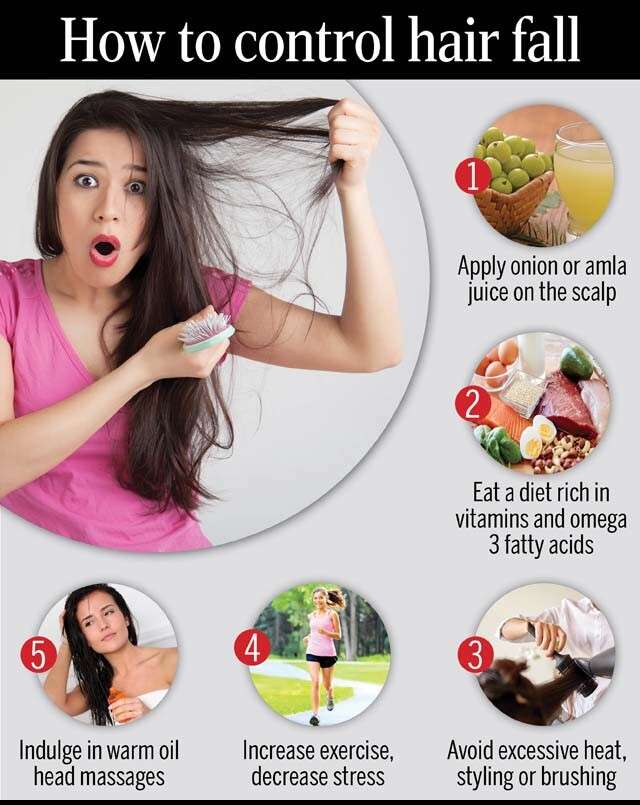
There’s a reason most women think of their hair as their ‘crowning glory’. The health and appearance of your mane can make and break your look. Thick, lustrous hair is the most desirable, but this can often be impacted by hair fall – that pesky ill that is the byproduct of bad scalp or hair health. Hair fall is caused due to several reasons, from lack of proper care, an improper diet, stress, lack of exercise, environmental reasons and so on. Controlling hair fall may seem insurmountable, but if you take the right steps and continue to follow them over time, it is easily done. Let’s take a look at how to control hair fall, with these simple hacks.
Use Onion Juice To Control Hair Fall
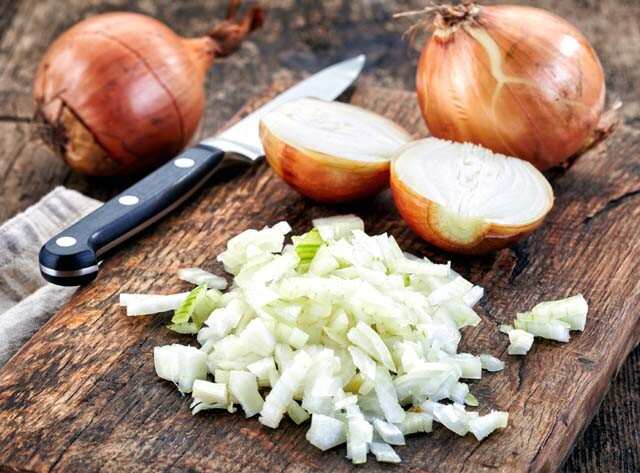
Don’t get put off by the strong, pungent smell! When grandma advocated that you use onion juice to sort out your hair fall issues, she knew what she was doing. Onion juice offers a host of nutrients and benefits that can control hair fall and prevent excessive shedding. The raw juice of the onion boasts antibacterial and antifungal properties, and keeps the scalp free of infection, preventing breakage and shedding at the root. It also contains the enzyme catalase, which is known tooptimise hair growth. What’s more, onion juice is a naturally rich source of sulphur, which stimulates the hair follicles, boosting fresh hair growth. If you find the juice to be too pungent-smelling, then you can add a few drops of lavender or peppermint essential oils to nullify it. Watch this video, to find out other ways to use onion juice to control hair fall.
Pro Tip: Squeeze the juice of three onions and apply all over scalp and hair to control hair fall. Leave on for five minutes, and then rinse.
Apply Amla Juice Over The Scalp To Control Hair Fall

The humble amla or Indian gooseberry is a miracle fruit and is often included in hair products, hair tonics and medical streams. Applying amla juice all over your hair and scalp is one of the most effective ways to control hair fall. Vitamin C in amla helps produce collagen protein, which boosts cell regeneration, stimulates both hair length and volume. Amla contains over 80 per cent moisture, and so has hydrating properties, which nourish the scalp and hair from insideand control hair fall. It is a natural scalp cleanser, removes germs, and is also an antioxidant,preventing hair damage. Truly nature’s superfood!
Pro Tip: Take the juice of 3-4 amlas (gooseberries) in a bowl, and apply it over the hair and scalp, to control hair fall.
Reduce Stress, Increase Exercise To Control Hair Fall

It is true that stress creeps up on us gradually, and we don’t take note of it until it gets out of hand! Stress has a far-reaching impact on hair and scalp health. Both physical and emotional stress can cause hair fall, which is called telogen effluvium. Here, the stress pushes hair follicles into a resting period, while the percentage of hair in the growth period reduces drastically. The most logical way to combat this is to obviously get rid of the stress. If you can’t entirely do that, then make some lifestyle changes – get enough sleep, exercise and me time to fight the negativity within yourself. Exercise is a must to control hair fall. When you exercise, it naturally increases blood circulation across the body, including the head and scalp. The result is healthy hair follicles, and therefore lesser hair fall. If an exercise causes sweating, use a damp towel to softly just cleanse the scalp and roots of the hair.
Pro tip: Seek a low-stress life, get enough sleep, exercise for at least one hour every day, and make small lifestyle changes.
Shampoo Your Hair With Rice Water To Control Hair Fall
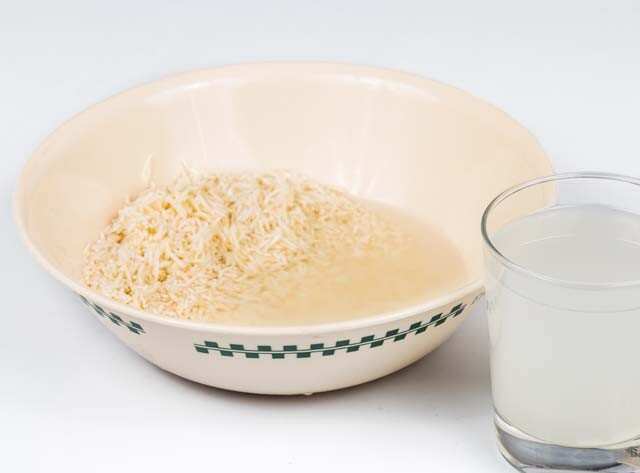
Did you know, in China, there is a village called Huangluo, home to native Red Yao women? The village is listed in the Guinness Book of Records as the ‘world’s longest hair village’. True to its name, the women here have long, thick and healthy hair that is consistently maintained. The villagers believe that it is a symbol of luck, longevity and prosperity. So what is the secret to their long and thick hair? An ancient but extremely simple Chinese remedy – rice water! This magic potion, used as a natural shampoo and rinse for centuries now, clearly works wonders to control hair fall. Rice water has a multitude of components with nutritional value for the hair. Around 16 per cent of these are proteins, the building blocks essential to cell health. Triglycerides and lipids each make up 10 per cent of the rice water composition, while starch (an extract still used in Japanese cosmetics), is present at 9 per cent. Carbohydrates, inositol, phytic acid and inorganic substances are other components in rice water. This is what you get when you boil an average handful of white rice in two cups of hot water and strain out the residue liquid.
Pro Tip: Rice water can be used as a shampoo as often as you shampoo your hair, or as a final rinse, to control hair fall.
Avoid Excessive Heat, Styling Or Brushing To Control Hair Fall

All said and done, styling products with harsh chemicals do affect the hair and scalp adversely. From blow-drying to ironing, from bleaching to colouring, all of it weakens the hair strands and hair follicles. While a lot of these treatments affect the hair strands (which means you can just chop off the hair and wait for fresh, glossy, healthy hair to grow back), some of them do actually impact the hair follicles and cause hair fall. The logical solution is to cut back on styling methods and products. Don’t use a blow dryer for instance, and let your hair dry naturally. Switch from chemical products to those that are more natural. Use anti-frizz products and consider investing in a good hair serum. How you brush your hair also has an impact on hair fall. Using a close-tooth comb or hairbrush on your hair in a rough manner, can lead to knotting, tangling, breakage and ultimately hair fall. To avoid this, it is ideal to use a wide-tooth comb, especially if you have hair that is prone to breakage at the roots. Slowly brush along the length of your hair, from root to tip, working on small sections at a time. If you encounter serious knots or tangles, unravel them gently with your fingers before running your comb through them. After you have thoroughly done this, you can use a regular comb to neaten or style your hair.
Pro tip: To control hair fall, cut back on styling and heat treatments, and brush your hair out gently with a wide-tooth comb.
Indulge In A Warm Oil Massage To Control Hair Fall

Hair fall is directly linked to scalp health. The healthier your scalp, the lesser the hair fall. Since your scalp is the base for your hair follicles, from which your hair grows, how you nourish impacts on your hair health too. If you don’t take care of your scalp properly, be prepared for dryness and infections, which result in dead hair follicles that promote hair fall. The best way to combat this is through a warm oil massage. There are a plethora of oils you can turn to, to accomplish this. Massaging the scalp can increase blood circulation, and boost hair growthand hair follicle health from within, while simultaneously hydrating and nourishing the scalp. Coconut oil, the eternal favourite, contains lauric acid, a medium chain fatty acid which strengthens the hair strands and prevents them from shedding. Other oils like castor, argan and olive oil can also be used to prevent hair fall.
Pro tip: Warm any hair oil of your choice and apply it all over the scalp to control hair fall.
Eat A Diet Rich In Vitamins And Omega 3 Fatty Acids To Control Hair Fall

If you’re doing everything else right, but not getting enough nutrition from your diet, chances are you’ll find it affecting hair fall as well. Omega 3 fatty acids are essential to keep your scalp and hair follicles from drying out, reducing inflammation (which is a major cause of hair shedding) and promoting hair growth. Try salmon – it is one of the best sources. Other fish like mackerel and sardines are also a great go-to option. Vegetarians can get your daily dose of omega 3 from avocados, flaxseeds, olive oil and walnuts, which are some of the most potent sources of this nutrient. Vitamins are the lifeline of your body’s nutrition, and also your hair’s. Vitamin C needs to be consumed to reduce free radicals and maintain collagen levels in the hair follicles, to make sure hair remains breakage-free. It is also an antioxidant and protects cells found in the scalp. Eat a generous helping of fruits like guavas, strawberries, kiwis and oranges. Vitamin A, which comes from beta carotene, produces sebum which keeps your scalp from drying out. Sweet potatoes, carrots, squashes and leafy greens are Vitamin A-rich foods. Animal liver is another great source of this essential nutrient. However, beware of excessive intake of vitamin A, which can also affect hair health adversely. B Vitamins are perhaps the most essential for hair and skin health! Vitamins B1 (thiamin), B2 (riboflavin) and B5 (pantothenic acid) are good for hair flexibility, strength and overall wellness. Biotin or Vitamin B7 is especially essential for hair growth, while folic acid deficiency could cause premature greying. For your dose of B Vitamins, eat eggs (don’t leave out the yolks – that’s where most of the nutrition comes from), beans, various fresh fish, oatmeal, yoghurt and free range chicken and turkey.
Pro tip: Control hair fall by consuming a nutritious diet, rich in protein, omega 3 fatty acids and vitamins.
FAQs: How To Control Hair Fall
Can hormonal imbalances be the cause of hair fall?
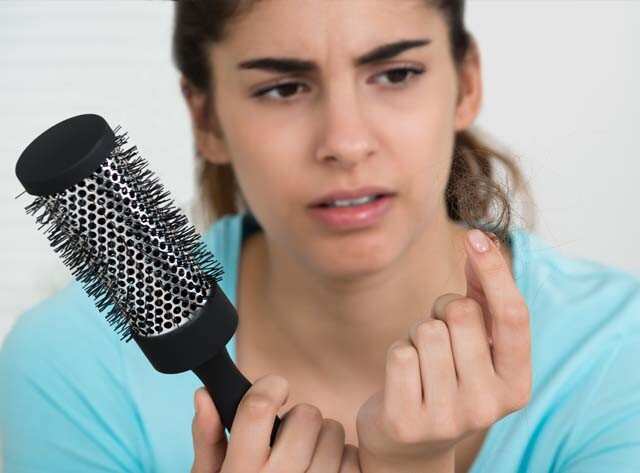
Hormonal imbalances in women are one of the most common causes of unnatural hair fall. Thyroid problems, going on and off contraceptives, are just some of the reasons your hair could be falling off in clumps! PCOS (polycystic ovary syndrome), antidepressants, blood thinners, and even autoimmune disorders could be the cause of thinning hair. Run all the prerequisite tests to figure out where the problem lies, and then visit a doctor to address it at the earliest. Often, the process of pregnancy and childbirth can trigger physical changes in your body, which then affect your hair adversely. This is a more common post childbirth rather than during pregnancy. The primary reason is the fact that estrogen levels, which have risen during pregnancy and are responsible for your thick hair throughout those nine months, suddenly drop once you give birth. This, combined with possible vitamin deficiency, can lead to postpartum hair fall. Deal with this by visiting your gynaecologist or trichologist, who will most likely give you a diet chart and supplement to combat this, as well as suggest certain lifestyle changes and shifts in what products you use. Until your hair stops falling, you can style and layer your hair to look fuller and better!
Pro tip: Seek professional help to sort out hormonal imbalance problems at the root.
How do I dry my hair to control hair fall?
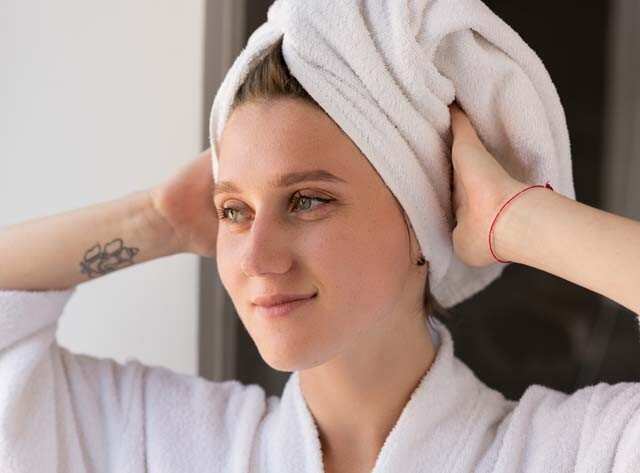
Letting your hair dry naturally or towel drying is obviously the best thing you can do for your hair, to control hair fall. As soon as you wash your hair, wrap it up in a turban on top, using a microfiber towel. Once the excess water has been soaked, gently pat the scalp and hair dry with a cotton towel till it is just about damp. Let the rest dry naturally. In case you’re in a hurry and need to get somewhere, blow drying your hair works best once it has already been towel dried. Try not to get it too close, or turn on the excess heat, unless you’re also styling your hair. Spray volumizer at the roots before drying, and leave-in conditioner to the ends.
Can genes be the cause of my hair fall? How can I control this?

While male pattern baldness is more common than female-pattern hair loss, it is true that your genes can be the cause of your thinning mane! Called androgenic or androgenetic alopecia, you may be more prone to hair fall if the women in your family also suffer from it. While there’s very little you can do to prevent it, a good hair care routine, diet and lifestyle definitely help. However, doctors do prescribe over-the-counter drugs and supplements to control hair fall, or in cases with extreme and noticeable hair fall, even surgery.

